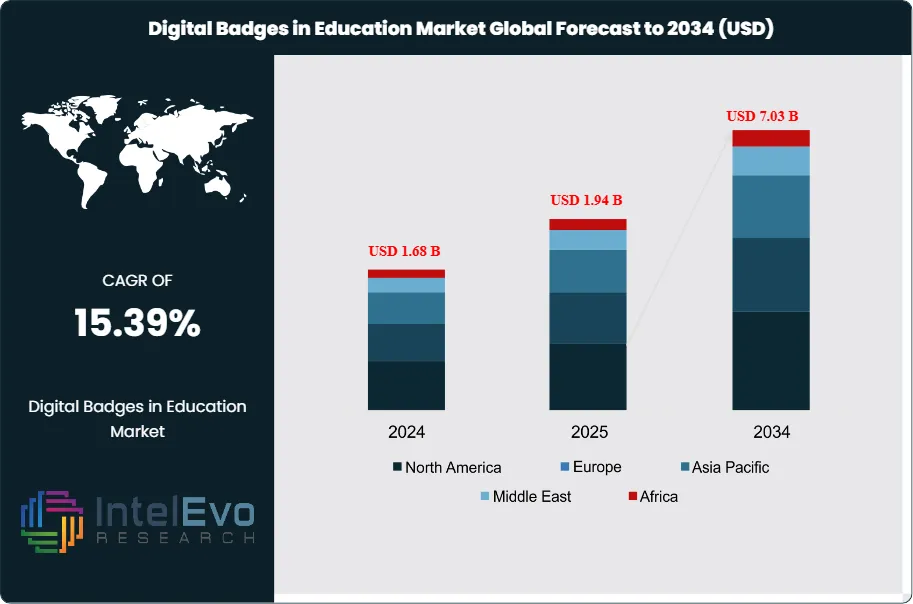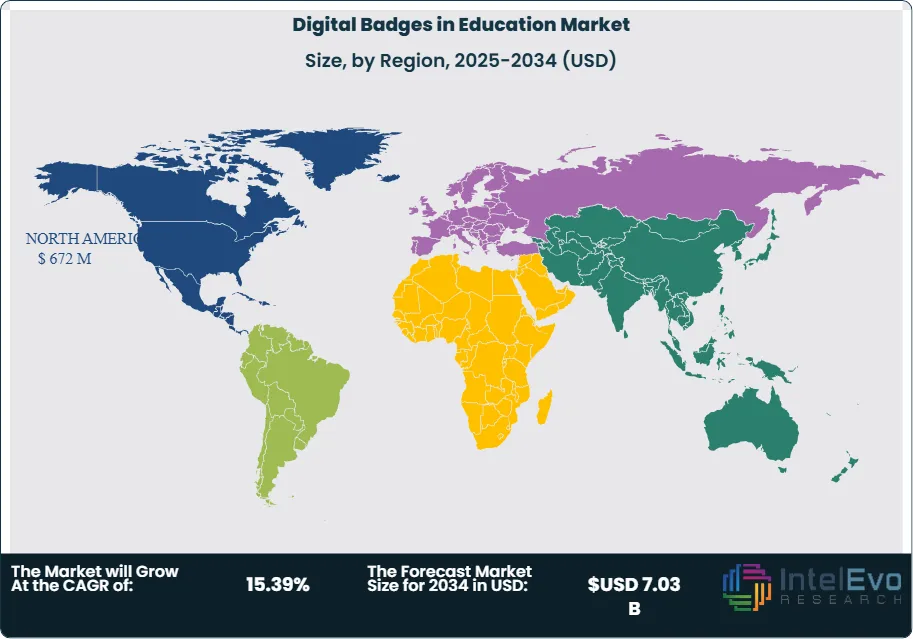
Digital Badges in Education Market to Hit USD 7.03 Bn by 2034 | CAGR 15.39%
Global Digital Badges in Education Market Size, Share, Analysis Report By Deployment Type (Cloud-based, On-premise) Badge Type (Skill-based, Achievement, Participation, Certification) End User (Higher Education Institutions, Corporate Training Organizations, Professional Associations, K-12 Educational Institutions, Government Agencies) Industry Region & Key Players-Industry Segment Overview, Market Dynamics, Competitive Strategies, Trends & Forecast 2025-2034
Report Overview
The Digital Badges in Education Market size is expected to be worth around USD 7.03 Billion by 2034, from USD 1.68 Billion in 2024, growing at a CAGR of 15.39% during the forecast period from 2024 to 2034. The Digital Badges in Education Market represents a rapidly evolving sector leveraging digital technology to recognize and validate learning achievements through verifiable, portable micro-credentials. These digital badges validate skills and achievements beyond traditional academic degrees, enabling lifelong learning and competency-based education. The market is experiencing transformative growth driven by increasing adoption of online learning platforms, gamified educational frameworks, and micro-credentialing systems that bridge the gap between formal education and practical employable skills.

Get More Information about this report -
Request Free Sample ReportSeveral critical factors are driving market expansion, including the growing demand for skill verification and continuous learning in an evolving job market where skills are rapidly changing. The rise of e-learning platforms and online certification programs has created substantial demand for verifiable proof of competencies that can be easily shared and recognized by employers. Integration with Learning Management Systems (LMS) and blockchain technology has enhanced security, verifiability, and widespread adoption of digital badges. However, the market faces challenges including lack of standardization across platforms and varying acceptance levels across industries, which can undermine credibility and make it difficult for employers to assess badge value.
North America dominates the digital badges education market, holding more than 40% market share in 2024 and generating USD 0.64 billion in revenue. This leadership stems from advanced digital infrastructure, strong presence of educational technology firms, and cultural emphasis on continuous learning and professional development. The region benefits from early adoption by educational institutions and corporations, supportive regulatory environments, and extensive integration of badges into e-learning platforms. Europe follows closely due to strong vocational training emphasis, while Asia-Pacific shows significant growth potential with rapidly expanding e-learning platforms and increasing focus on professional certifications.
The COVID-19 pandemic significantly accelerated the digital badges market as organizations rushed to bridge skills gaps created by remote work culture. Increased demand for online learning during the pandemic fueled market development, with businesses investing heavily in employee skill development and digital recruitment methods where badges could distinguish candidates from other applicants. The shift to remote learning environments and digital learning systems drove substantial market expansion, with companies like Unnati issuing digital certificates and badges via platforms like CertifID to better manage student experiences and data during the pandemic period. This transformation established digital badges as essential tools for validating skills in the new digital-first learning landscape.
Regional conflicts between major economies have created significant disruptions in the digital badges education market through supply chain interruptions and increased tariff barriers. U.S. tariffs on digital badge infrastructure components, particularly those imported from China, have imposed a 25% tariff on high-performance hardware including GPUs, servers, and networking devices essential for modern LMS platforms. These tariffs significantly increase deployment and maintenance costs for educational institutions, potentially slowing adoption rates in the U.S. market despite strong underlying demand. Regional conflicts have also disrupted critical supply chains, with wars affecting key transportation routes like the Red Sea region causing shipping companies to avoid traditional routes, leading to increased costs and delays that impact the technology infrastructure supporting digital badge platforms. The ongoing geopolitical tensions have forced governments to resort to economic retaliation through sanctions and trade restrictions, affecting long-standing trade relationships and increasing costs for educational technology imports.
Major trade deals between countries are creating new opportunities for digital badges market expansion through enhanced educational cooperation and technology transfer agreements. India has established significant bilateral trade agreements including the India-UAE Comprehensive Economic Partnership Agreement (CEPA) and India-Australia Economic Cooperation and Trade Agreement (ECTA), which facilitate technology services and educational partnerships. The India-EFTA Trade and Economic Partnership Agreement (TEPA) signed in March 2024 commits to USD 100 billion in foreign direct investment and 1 million job creation, supporting educational technology initiatives including digital credentialing systems. Ongoing negotiations between India-EU and India-UK for comprehensive Free Trade Agreements covering 23 policy areas are expected to boost digital education services and cross-border recognition of digital credentials. The African Continental Free Trade Area (AfCFTA) has increased intra-African trade cooperation, helping member countries like Kenya and Nigeria develop regional digital education standards and badge recognition systems. These trade agreements are establishing frameworks for mutual recognition of digital badges across borders, standardization of credentialing systems, and technology sharing that will drive global market growth.

Key Takeaways
- Market Growth: The Digital Badges in Education Market is expected to reach USD 7.03 Billion by 2034, driven by the growing adoption of competency-based learning, digital transformation in education, and increasing demand for verifiable skill credentials in the modern workforce.
- Deployment Type Dominance: Cloud-based solutions dominate the deployment segment, driven by scalability, cost-effectiveness, and ease of integration with existing learning management systems.
- Badge Type Dominance: Skill-based badges dominate the digital badges education market as they provide verifiable, granular proof of specific competencies that align directly with industry demands and career advancement needs.
- End User Dominance: Higher education institutions lead the digital badges market adoption due to their need for flexible credentialing solutions that bridge academic learning with industry requirements and workforce readiness.
- Drivers: Key drivers accelerating growth include the shift toward competency-based education, remote learning adoption, and increasing employer recognition of digital credentials as valid proof of skills and knowledge.
- Restraints: Growth is challenged by lack of standardization across platforms, limited interoperability between badge systems, and varying levels of employer acceptance in traditional industries.
- Opportunities: The market presents significant opportunities through blockchain integration for enhanced security, AI-powered personalized learning paths, and expansion into emerging markets with developing digital education infrastructures.
- Trends: Emerging trends include micro-credentialing, stackable badge programs, and integration with professional social networks for enhanced credential visibility and networking opportunities.
- Regional Leader: North America leads with advanced infrastructure and early adoption, while Asia-Pacific shows the highest growth potential due to rapid educational digitalization and government support for educational technology initiatives.
Deployment Type Analysis:
Cloud-based deployment has emerged as the leading approach, capturing majority market share through its superior scalability, reduced infrastructure requirements, and enhanced accessibility across devices and locations. Educational institutions are increasingly migrating from traditional on-premise systems to cloud-based digital badge platforms to achieve better cost-effectiveness, automatic updates, and seamless integration with existing learning management systems. This shift enables institutions to respond more quickly to changing educational needs, reduce IT infrastructure costs, and access advanced features without significant hardware investments, making cloud deployment the preferred choice for both established universities and emerging educational technology companies.
Badge Type Analysis:
Skill-based Badges Leads With over 40% Market Share In Digital Badges in Education Market, Skill-based badges lead this segment because they offer the most tangible value proposition for learners and employers alike. These badges validate specific technical or soft skills through rigorous assessment criteria, making them highly sought after in today's skill-driven economy. Unlike generic certifications, they break down complex competencies into digestible, achievable units that learners can pursue incrementally. Achievement badges follow as secondary drivers, recognizing milestone accomplishments and motivating continued learning through gamification elements. Participation badges serve as engagement tools, encouraging initial involvement and sustained activity in educational programs. Competency-based badges, while valuable for comprehensive skill validation, occupy a smaller market share due to their complexity in implementation and assessment requirements across diverse educational contexts.
End User Analysis:
Higher education institutions remain the primary end users in the Digital Badges in Education market, investing heavily in digital credentialing solutions to enhance student engagement, validate learning outcomes, and strengthen industry partnerships. Corporate training departments utilize digital badges to recognize employee skill development, support career progression, and align training programs with business objectives. Professional associations rely on badge systems to maintain member engagement, validate continuing education requirements, and provide industry-recognized credentials. K-12 educational institutions are increasingly adopting digital badges to motivate student learning, recognize achievements beyond traditional grades, and prepare students for digital literacy requirements. Together, these end users drive strong demand for comprehensive and user-friendly digital badge platforms that enhance learning outcomes, improve credential recognition, and support the evolving needs of modern education and workforce development.
Regional Analysis
North America Leads With nearly 40% Market Share In Digital Badges in Education Market, North America leads the global Digital Badges in Education market with a commanding market share, driven by its mature educational technology infrastructure, high adoption rates of innovative learning solutions, and strong industry-education partnerships. The region benefits from established higher education systems, progressive educational policies that embrace competency-based learning, and a robust technology ecosystem that supports innovation. Major universities and corporate training organizations maintain significant influence on market development, driving demand for sophisticated digital credentialing solutions.
Asia-Pacific represents the fastest-growing regional market, fueled by rapid digitalization of education systems, increasing government investments in educational technology, and growing recognition of digital credentials across emerging economies. Countries like India and China are implementing large-scale educational technology initiatives, creating significant opportunities for digital badge platform providers. The region's growth is supported by expanding internet connectivity, rising smartphone adoption, and government policies that encourage innovation in education delivery.
Europe maintains a stable market position with steady growth driven by harmonized educational standards, strong emphasis on vocational training, and increasing adoption of digital learning technologies across the European Union. Latin America and the Middle East & Africa regions show moderate growth potential, supported by ongoing educational modernization efforts and increasing recognition of digital credentials in professional development contexts.

Get More Information about this report -
Request Free Sample Report
Key Market Segment
Deployment Type
- Cloud-based
- On-premise
Badge Type
- Skill-based Badges
- Achievement Badges
- Participation Badges
- Certification Badges
End User
- Higher Education Institutions
- Corporate Training Organizations
- Professional Associations
- K-12 Educational Institutions
- Government Agencies
Region
- North America
- Europe
- Asia-Pacific
- Latin America
- Middle East & Africa
| Report Attribute | Details |
| Market size (2025) | USD 1.94 B |
| Forecast Revenue (2034) | USD 7.03 B |
| CAGR (2025-2034) | 15.39% |
| Historical data | 2018-2023 |
| Base Year For Estimation | 2024 |
| Forecast Period | 2025-2034 |
| Report coverage | Revenue Forecast, Competitive Landscape, Market Dynamics, Growth Factors, Trends and Recent Developments |
| Segments covered | Deployment Type (Cloud-based, On-premise), Badge Type (Skill-based Badges, Achievement Badges, Participation Badges, Certification Badges), End User (Higher Education Institutions, Corporate Training Organizations, Professional Associations, K-12 Educational Institutions, Government Agencies) |
| Research Methodology |
|
| Regional scope |
|
| Competitive Landscape | Credly Inc., Accredible, Badgr by Concentric Sky, Skillsoft Corporation, Open Badge Factory, Badge List, Portfolium, International Institute of Business Analysis (IIBA), Nocti Business Solutions, ForAllSystems, Learning Machine (acquired by Hyland), Pearson Education |
| Customization Scope | Customization for segments, region/country-level will be provided. Moreover, additional customization can be done based on the requirements. |
| Pricing and Purchase Options | Avail customized purchase options to meet your exact research needs. We have three licenses to opt for: Single User License, Multi-User License (Up to 5 Users), Corporate Use License (Unlimited User and Printable PDF). |
Frequently Asked Questions
How big is the Digital Badges in Education Market?
The Digital Badges in Education Market will reach USD 7.03 Billion by 2034, growing at a CAGR of 15.39% from 2024. Explore key trends and insights now!
Who are the major players in the Digital Badges in Education Market?
Credly Inc., Accredible, Badgr by Concentric Sky, Skillsoft Corporation, Open Badge Factory, Badge List, Portfolium, International Institute of Business Analysis (IIBA), Nocti Business Solutions, ForAllSystems, Learning Machine (acquired by Hyland), Pearson Education
Which segments covered the Digital Badges in Education Market?
Deployment Type (Cloud-based, On-premise), Badge Type (Skill-based Badges, Achievement Badges, Participation Badges, Certification Badges), End User (Higher Education Institutions, Corporate Training Organizations, Professional Associations, K-12 Educational Institutions, Government Agencies)
How can this market research report help my business make strategic decisions?
Our market research reports provide actionable intelligence, including verified market size data, CAGR projections, competitive benchmarking, and segment-level opportunity analysis. These insights support strategic planning, investment decisions, product development, and market entry strategies for enterprises and startups alike.
How frequently is the data updated?
We continuously monitor industry developments and update our reports to reflect regulatory changes, technological advancements, and macroeconomic shifts. Updated editions ensure you receive the latest market intelligence.
Select Licence Type
Connect with our sales team
Digital Badges in Education Market
Published Date : 26 Aug 2025 | Formats :Why IntelEvoResearch
100%
Customer
Satisfaction
24x7+
Availability - we are always
there when you need us
200+
Fortune 50 Companies trust
IntelEvoResearch
80%
of our reports are exclusive
and first in the industry
100%
more data
and analysis
1000+
reports published
till date







